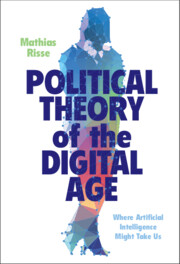Book contents
- Political Theory of the Digital Age
- Political Theory of the Digital Age
- Copyright page
- Dedication
- Contents
- Preface
- Acknowledgments
- 1 Introduction
- 2 Learning from the Amish
- 3 Artificial Intelligence and the Past, Present, and Future of Democracy
- 4 Truth Will Not Set You Free: Is There a Right to It Anyway?
- 5 Knowing and Being Known
- 6 Beyond Porn and Discreditation
- 7 The Fourth Generation of Human Rights: Epistemic Rights in Life 2.0 and Life 3.0
- 8 On Surveillance Capitalism, Instrumentarian Power, and Social Physics
- 9 Data as Social Facts: Distributive Justice Meets Big Data
- 10 God, Golem, and Gadget Worshippers: Meaning of Life in the Digital Age
- 11 Moral Status and Political Membership: Toward a Political Theory for Life 3.0
- Epilogue
- Bibliography
- Index
5 - Knowing and Being Known
Investigating Epistemic Entitlements in Digital Lifeworlds
Published online by Cambridge University Press: 02 February 2023
- Political Theory of the Digital Age
- Political Theory of the Digital Age
- Copyright page
- Dedication
- Contents
- Preface
- Acknowledgments
- 1 Introduction
- 2 Learning from the Amish
- 3 Artificial Intelligence and the Past, Present, and Future of Democracy
- 4 Truth Will Not Set You Free: Is There a Right to It Anyway?
- 5 Knowing and Being Known
- 6 Beyond Porn and Discreditation
- 7 The Fourth Generation of Human Rights: Epistemic Rights in Life 2.0 and Life 3.0
- 8 On Surveillance Capitalism, Instrumentarian Power, and Social Physics
- 9 Data as Social Facts: Distributive Justice Meets Big Data
- 10 God, Golem, and Gadget Worshippers: Meaning of Life in the Digital Age
- 11 Moral Status and Political Membership: Toward a Political Theory for Life 3.0
- Epilogue
- Bibliography
- Index
Summary
Foucault problematizes the relationship between knowledge and power in ways that more traditional epistemology has not, with power always already shaping what we consider knowledge. To capture the nexus between power and knowledge, he introduces the term “episteme.” The significance of an era’s episteme is easiest to see in terms of what it does to possibilities of self-knowledge. Therefore I pay special attention to this theme by way of introducing the theoretical depth of Foucault’s notion. I then develop Foucault’s ideas further, specifically for digital lifeworlds. With this vocabulary in place, I introduce the notion of “epistemic actorhood” that lets us capture the place of an individual in a given episteme. It is in terms of this place that we can turn to the notions of epistemic rights and epistemic justice. Epistemic actorhood comes with the four roles of individual epistemic subject, collective epistemic subject, individual epistemic object, and collective epistemic object. Using this vocabulary we can then also articulate the notions of an epistemic right and of epistemic justice and develop them in the context of digital lifeworlds. Digital lifeworlds engage individuals both as knowers and knowns in new ways. The framework introduced in this chapter captures this point.
- Type
- Chapter
- Information
- Political Theory of the Digital AgeWhere Artificial Intelligence Might Take Us, pp. 96 - 118Publisher: Cambridge University PressPrint publication year: 2023

